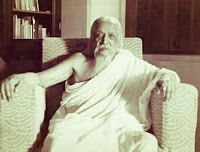1. Introduction:
Sri Aurobindo Ghosh (1872-1950), Indian nationalist and mystic philosopher, ranks among the greatest personalities of modern India. He is a multifaceted genius-a political revolutionary, social reformer, historian, educationist, philosopher, yogi and above all, man of letters. He is a journalist, editor, literary critic, linguist, translator, essayist, short story writer, dramatist and more than all of these, a great poet.
2. His Learning:
K.R. Srinivasa says that ‘Aurobindo was not merely a writer who happened to write in English but really an English writer’. In fact, after spending his early days in England and then retuning to Baroda he reorients his western studies with the studies of Sanskrit and modern Indian Languages. By the process he gains contact with his Indian heritage through a program of rigorous scholarship. He gains a deep insight into Indian culture and civilization. This learning moulds his poetry and philosophy.
3. A Quest after the Life Divine:
Sri Aurobindo’s poetry is meant to bridge the present and the future, self-divided present life and Life Devine that is to be. Ghose's teachings emphasize a two-way path to salvation. Enlightenment comes from the divinity above, but human beings possess a spiritual “super-mind” that enables them to reach upward toward illumination. Spiritual perfection is achieved through Yoga practices that lead to the ultimate fusion of these two drives.
 |
| Sri Aurobindo Ghosh |
“Love is divine
Love is the hoop of the Gods
Hearts to combine”
Love is not love if it a curse in evil; great and true love is a power and it can break open the doors of captivity, it can change gross to gold, it can defy death or it is not love.
The Lovers in Urvasie fail for their limitation in ultimate realization. But Savitri in Savitri (published much later in 1954) alone who fuses the lesser and the greater realizations in to an integral and to tall transformation of limited human life in to the fullness and splendor of the Life Divine.
Even in A Tree, his earlier poem contains his quintessence of philosophy in which he sees us as divided beings, one part of us happy with our present attainment, another thirsting for higher thing. In Life and Death he tells that Death is Life disguised; that what appears to be death is another Kind of life. In Savitri too at the climactic moment in the epic, it is death itself which reveals its true face as the supreme Lord of Life and Delight.
4. Key Elements in Aurobindo's poetry:
Spiritual Exploration:
Aurobindo's poetry delves deeply into spiritual and metaphysical themes, drawing from his own spiritual experiences and philosophical insights. His works, like "Savitri," are infused with a profound sense of spirituality, exploring the nature of consciousness and the divine.
Synthesis of Cultures:
Aurobindo's poetry reflects his belief in the synthesis of Eastern and Western thought. He seamlessly blends Indian spirituality with Western literary forms and themes, creating a unique fusion that resonates with readers across the globe.
Mystical Vision:
His poetry often conveys a sense of mysticism and transcendence, inviting readers to contemplate the mysteries of existence and the inner realms of consciousness. This mystical dimension adds depth and universality to his work.
Language and Style:
Aurobindo's command over the English language is commendable. His poetry is marked by rich imagery, intricate metaphors, and a lyrical quality that captivates readers. His ability to express complex spiritual ideas in a poetic form is a testament to his literary prowess.
Social and Political Commentary:
While primarily known for his spiritual poetry, Aurobindo's earlier works also delve into social and political issues of his time. His poems often carry subtle critiques of colonialism and imperialism, making them relevant to the socio-political context of his era.
Legacy and Influence:
Aurobindo's contributions to Indian English poetry have left an indelible mark on the genre. His works continue to inspire poets and scholars, and his ideas have had a lasting impact on the development of Indian literature in English.
The ultimate realization:
Aurobindo’s philosophical and mystical glow is through an integral view of man, Nature and will change the face of the world. In Savitri, his masterpiece, he succeeds to a great extent in expressing most mystic experiences and yogic realizations. Aurobindo arrives at the conclusion that releases from bondage and changes with the secret knowledge, the soul achieves a complete spiritual transformation. Savitri is cast for minutely cosmic role of struggle and redemption, and is the incarnation of Divine mother. Savitri is both the response and the resulting transformation.
Conclusion:
Sri Aurobindo is a skillful craftsman in the use of blank verse and felicity in poetic expression. His grand and mystic style in poetic works are ample testimony of his stupendous achievements.
Ref:
Indian literature in English : Walsh, William, 1916- : Free Download, Borrow, and Streaming : Internet Archive. (n.d.). Internet Archive. https://archive.org/details/indianliterature0000wals

Really sir your updated and regular discussions give me inspiration to acquire knowledge. It will be the most perfect if all the spellings are spelt correctly
ReplyDelete